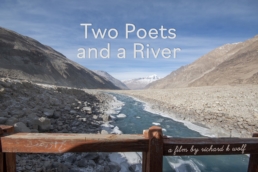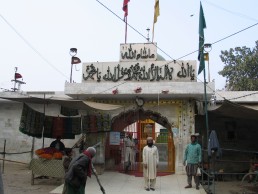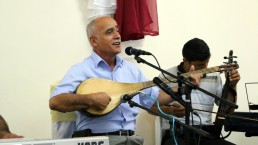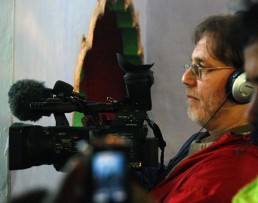I am a professor of Music and South Asian Studies at Harvard University who conducts ethnomusicological field research on the musical traditions, languages and cultures of South, Central and West Asia. This site contains materials such as audio/video recordings and photographs aimed at those broadly interested in these regions. For scholars and students, this site also provides descriptions of my research areas, summaries of the concepts I’ve developed over the course of my career, access to my publications, as well as media annotations, bibliographies, syllabi, and dictionaries.
Current Projects
Pots of Millet, Faces of Gold: Transformation
An ethnographic film by Richard K. Wolf
Pots of Millet, Faces of Gold: Transformation is the first in a series of experimental ethnographic films that draw from Richard K. Wolf’s research with the Kota people of South India over the past 35 years. As an indigenous community with a population of fewer than 2,500, the Kotas have, in their own telling, weathered periods of enormous loss—death through disease, the trauma of internal displacement, and disruptions in transmission of traditional knowledge. This first film is presented as a time capsule, addressed to Kota people 100 years in the future, and narrated in the Kota language by Wolf’s Kota collaborator Duryodana in a way that connects the action on screen to himself and to Wolf. The Kotas have long been famous in the ethnographic record for their roles as craftspeople and musicians for other communities in the Nilgiri Hills. Wolf’s own research has focused on the more elaborate artistic and ritual activity by and for members of the Kota community themselves. The film thematizes music and the transformation of materials, bodies, and spiritual entities, moving from making pottery and musical instruments, to using these items in multiday mortuary ceremonies. Incorporating Wolf’s own footage in multiple formats transferred to film, as well as archival movie footage and cylinder recordings from 1938, the film provides striking impressions of village life over time from the perspectives of researchers and the Kotas themselves. Runtime 79 min. Kota and Tamil with English subtitles. Distributed by Documentary Educational Resources.
Two Poets and a RiverAn Ethnographic Film by Richard K. Wolf
Using the Oxus river as a topos, the film Two Poets and a River explores themes of love and loss through the lives and musical poetry of the two most prominent and innovative Wakhi musicians in Central and South Asia: Qurbonsho in Tajikistan and Daulatsho in Afghanistan. These two poet-singers share a common language, faith, and family network and yet remain separated by vicissitudes of the 19th c. Great Game in Central Asia. The condition of being separated by a river evokes the feeling of separation (firāq) and grounds the poets’ discussions of love and loss in their own lives as well as in their musical arts. Richard K. Wolf shot and produced the film over 2.5 years (2012-2024) with the editorial collaboration of both Qurbonsho and Daulatsho, who narrate the film in Wakhi, Tajik and Dari. The film and soundtrack are distributed by Documentary Educational Resources.
The ‘Urs of Madho Lal HusainA short film by Richard K. Wolf
This is an ‘urs (Ar: “wedding”) commemorating the death day of Shah Husain (1539–1600), one of the most celebrated mystical poets of the Panjab. Known for his ecstatic dancing in red (lāl) garb and love for a Brahman boy named Mādho, this Sufi saint is popularly called Mādholāl Husain. Shah Husain is also famous for a type of poetry, called “kafi,” which treats complex symbolic themes of love, eroticism, and devotion in a compact form. I videotaped scenes of this ‘urs in 1997 while sitting in a banyan tree, my videocamera literally beginning to disintegrate as I taped (some of this is visible in the images). I edited together short clips to bring out themes of interest to me and brought the video back to the shrine 5 years later for feedback interviews with mendicants and ordinary shrine-goers. The results of this process as well as further details regarding the saint and the celebration are published in my article, The Poetics of Sufi Practice (2006).
Featured Audio Annotation
Ismoil Nazriev, one of the leading folk artists of Tajikistan, performs here with his disciple Dustmurod and son at a wedding reception in Dushanbe, Tajikistan, 8-8-14. Nazriev plays the soz, an instrument often associated with Turkish music but also found in Tajik folk music and played like other long-necked fretted lutes such as the panjtor and Kashgar rubob. Dustmurod plays the (electric) violin vertically; played in this way, the instrument is a replacement for and named after the stick fiddle, ghijak. Nazriev’s son plays electronic keyboards. The song featured here, Qalabandi, is a famous one in the sabk-i Darvoz, the style of music that emerged in the Badakhshani district of Darvoz, largely through musicians such as Akasharif Juraev (the song’s composer) and Ismoil Nazriev’s own father, Abdullo Nazriev. The song is prefaced by moral poetic texts sung in elastic rhythm, a genre known as shahd (honey).
Ethnomusicological Fieldwork
Richard K. Wolf
As a freshman at Oberlin College in 1980, Richard Wolf was an active rock music composer, lead guitarist and student of Renaissance lute and classical guitar. Then an extraordinary concert of south Indian classical (Karnatak) music at Oberlin led him to make lifechanging decisions. He traveled to south India a few years later, where he studied Karnatak vina, vocal music, mridangam and Tamil.




